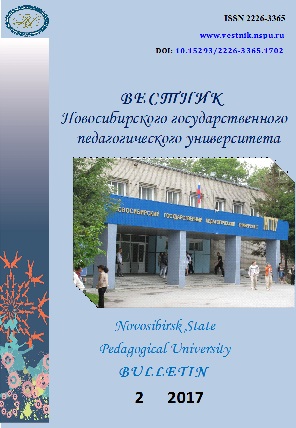Развитие научной физиологической школы в Новосибирском государственном педагогическом университете
Development of scientific physiological school at Novosibirsk state pedagogical university
Author(s): Anastasia Sergeevna Panova, Mikhail Albertovich SubotyalovSubject(s): Education, History of Education, Sports Studies
Published by: Новосибирский государственный педагогический университет
Keywords: History; biology; human physiology; school; kidneys; renal function; metabolism; safety;
Summary/Abstract: Introduction. The article is devoted to the review of the stages of formation and development of a scientific school on the basis of the Anatomy, Physiology and Safety of Life Depart-ment at Novosibirsk State Pedagogical University, which is one of the branches of the largest in the world I.P. Pavlov’s physiological school. The purpose of the article is to investigate the pro-cess of the formation of a scientific physiological school under the guidance of professor R.I. Aizman. Materials and Methods. The authors employed the comparative-historical and analytic methods of historical-biological research. Results. The results contain identification and presentation of a brief description of the prerequisites and main periods in the development of the scientific school. The authors identi-fied four stages of the scientific school development: the background period, the period of formation, the period of development and the present period. The fundamental role of professor A.G. Ginetsinsky and professor L.K. Velikanova in the formation of the physiological school in Novosibirsk Pedagogical Institute is emphasized. The authors outlined the following key fields of the scientific school: the study of kidney function and water-salt metabolism (renal physiology); research of morphofunctional and psychophysiological basis of health of all participants of the educational process under the influence of various environmental factors; correction of homeo-static parameters of an organism in conditions of pathology and its experimental modeling. The main results of the long-term work of the school are presented. Within the framework of the first direction, the members of the scientific school have studied the formation of mechanisms of osmotic, ionic and volume homeostasis regulation in ontogeny and the development of their reliability; for the first time, all stages of water-salt metabolism regulation mechanisms of humans have been studied; the influence of various factors (environment, gender, type of body constitution, intake of substances) on the system state was established at normal and pathological conditions (diabetes mellitus, renal insufficiency) and methods for correcting disturbed homeostatic parameters were developed. On the second direction, the influence of individual typological and ethnic characteristics, as well as the learning conditions and the level of motor activity on the morphofunctional and psychophysiological parameters of the organism at different stages of ontogeny, have been studied. Within the framework of the third topic, the members of the research team showed the effect of various substances in the experimental modeling of disorders of carbohydrate metabolism, acute renal failure, and osteoporosis. Conclusion. In conclusion, the authors confirm the correspondence of the scientific physiological school created under the leadership of R.I. Aizman, to all the criteria of a scientific school (the presence of a leader, the succession of generations, the unity of problems, the duration of existence in time and space, recognition of the contribution to science from other members of the disciplinary scientific community).
Journal: Вестник Новосибирского государственного педагогического университета
- Issue Year: 7/2017
- Issue No: 2
- Page Range: 50-69
- Page Count: 20
- Language: Russian

